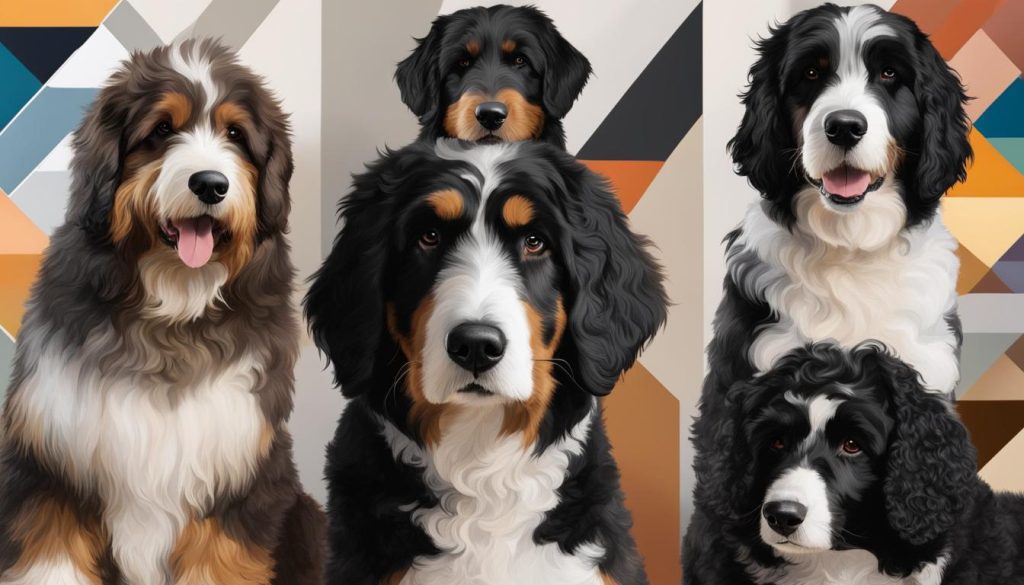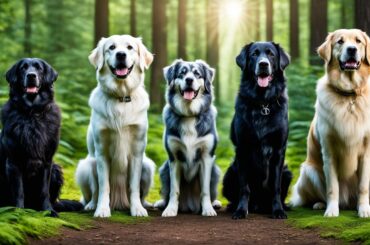Welcome to my comprehensive guide on Bernese Mountain Dog Poodle Mix, also known as Bernedoodle or Bernese Poodle Mix. This designer dog breed has gained popularity for its adorable appearance and wonderful personality. If you are considering adding a Bernedoodle to your family, or simply curious about this hybrid, you’ve come to the right place. In this article, I will cover everything you need to know about Bernese Mountain Dog Poodle Mix, including their sizes, characteristics, coat types, temperament, exercise needs, and more.
Key Takeaways:
- Bernese Mountain Dog Poodle Mix, also known as Bernedoodle, is a popular designer dog breed.
- Bernedoodles come in different sizes, such as standard, miniature, and toy, depending on the Poodle parent and the Bernedoodle generation.
- They have various coat types, ranging from curly to straight, with curlier coats being more hypoallergenic.
- Bernedoodles are known for their friendly and playful nature, making them great family pets.
- Regular exercise and grooming are important for maintaining the health and well-being of Bernedoodles.
The Different Generations of Bernedoodles
Bernedoodles come in different generations, each with its unique characteristics and traits. Understanding the differences between these generations can help you choose the right Bernedoodle for your family. Let’s take a closer look at the various generations of Bernedoodles:
F1 Bernedoodle
The F1 Bernedoodle is a first-generation mix of 50% Bernese Mountain Dog and 50% Poodle. This generation often exhibits a blend of characteristics from both parent breeds. F1 Bernedoodles are known for their friendly and sociable nature, making them great family pets.
F1B Bernedoodle
The F1B Bernedoodle is a backcross of an F1 Bernedoodle and a Poodle. This generation is 75% Poodle and 25% Bernese Mountain Dog. F1B Bernedoodles typically have a curlier coat and are often hypoallergenic, making them a popular choice for individuals with allergies.
F2 Bernedoodle
The F2 Bernedoodle is a second-generation mix of two F1 Bernedoodles. This generation can have a wider range of characteristics, as they inherit traits from multiple generations. F2 Bernedoodles can vary in size, coat type, and temperament.
F3 Bernedoodle
The F3 Bernedoodle, also known as a multigen Bernedoodle, is a mix of second-generation or higher Bernedoodles. This generation continues to refine the breed traits and characteristics. F3 Bernedoodles often have consistent coat types and personalities, making them a popular choice for families.
| Generation | Percentage of Bernese Mountain Dog | Percentage of Poodle | Characteristics |
|---|---|---|---|
| F1 Bernedoodle | 50% | 50% | Blend of Bernese and Poodle traits |
| F1B Bernedoodle | 25% | 75% | Curlier coat, hypoallergenic |
| F2 Bernedoodle | Varies | Varies | Wide range of characteristics |
| F3 Bernedoodle | Varies | Varies | Consistent coat types and personalities |
Each generation of Bernedoodles offers its own set of qualities, so consider your preferences and lifestyle when choosing a Bernedoodle.
Bernedoodle Coat Types and Characteristics
The coat of a Bernedoodle can vary depending on the genetics inherited from its Bernese Mountain Dog and Poodle parents. Three main coat types are commonly seen in Bernedoodles: curly, wavy, and straight. Each coat type comes with its own set of characteristics and maintenance requirements.
The curly coat is often the most desired for its hypoallergenic properties. It tends to shed less and is more suitable for individuals with allergies. However, the curly coat also requires regular grooming to prevent matting and keep it looking its best. The wavy coat falls between curly and straight, offering a balance of low shedding and less maintenance. The straight coat, on the other hand, may shed more and is less common in Bernedoodles.
no dog is completely hypoallergenic, as allergens can still be present in the dander and saliva. However, Bernedoodles with curlier coats are less likely to cause allergic reactions in sensitive individuals. Regular grooming, including brushing and occasional professional grooming, is necessary to keep the coat healthy and free from mats or tangles.
| Coat Type | Shedding | Maintenance Level | Hypoallergenic |
|---|---|---|---|
| Curly | Low | High | Yes (less likely to cause allergies) |
| Wavy | Low to moderate | Moderate | Yes (with reduced allergenicity) |
| Straight | Moderate to high | Low | No |
When choosing a Bernedoodle, consider your preferences for shedding, grooming, and hypoallergenic properties. It’s also essential to consult with a reputable breeder who can provide guidance on the coat types available in their litters. Don’t forget that coat type can vary even within the same litter, so it’s always a good idea to meet the puppies in person before making your decision.

Final Thoughts
The coat type of a Bernedoodle plays a significant role in its overall appearance, shedding, and maintenance requirements. Curly coats are often preferred for their hypoallergenic properties and reduced shedding, while wavy and straight coats offer alternative options. Regular grooming and care are necessary for all coat types to keep them healthy and free from mats. By understanding the different coat types and their characteristics, you can make an informed decision when choosing a Bernedoodle that suits your lifestyle and preferences.
The Size Varieties of Bernedoodles
Bernedoodles come in different sizes, making them suitable for various living situations. Whether you live in a spacious house or a cozy apartment, there is a size variety that can fit your lifestyle. Let’s explore the different sizes of Bernedoodles:
Standard Bernedoodle
The standard Bernedoodle is the largest size variety, known for its impressive size and stature. They can weigh between 55-90 pounds and stand 23-27 inches tall. Standard Bernedoodles are well-suited for families with ample living space and enjoy outdoor activities. Their size and energy levels make them great for long walks or engaging in playtime.
Miniature Bernedoodle
The miniature Bernedoodle is a medium-sized option that is smaller than the standard Bernedoodle but still has a sturdy build. They typically weigh between 25-55 pounds and stand 15-22 inches tall. Miniature Bernedoodles are a popular choice for individuals and families living in apartments or homes with limited space. Despite their smaller size, they still possess the same friendly and playful nature as their larger counterparts.
Toy Bernedoodle
The toy Bernedoodle is the smallest size variety, making them an ideal choice for those seeking a compact companion. They weigh between 10-25 pounds and stand 15 inches or less. Toy Bernedoodles are perfect for apartment living or for individuals who prefer a smaller dog. Despite their size, they do not compromise on personality and are just as loyal and affectionate as their larger counterparts.

When choosing a Bernedoodle, consider the size that suits your living situation and preferences. Whether you opt for a standard, miniature, or toy Bernedoodle, you can expect a loving and devoted companion that will bring joy to your life.
Bernedoodle Temperament and Personality
Bernedoodles are beloved for their loyal, affectionate, and playful nature. They make fantastic family pets, as they form strong bonds with their human companions and thrive on human interaction. Whether it’s playing fetch in the backyard or snuggling on the couch, Bernedoodles are always eager to be by your side. They are known for their friendly and gentle disposition, making them excellent with children and other pets.
Proper socialization and training play a crucial role in shaping a Bernedoodle’s temperament. Early socialization exposes them to different people, environments, and experiences, helping them develop into well-rounded and confident dogs. Positive reinforcement-based training methods work best with Bernedoodles, as they are highly intelligent and eager to please. With consistency, patience, and rewards, you can teach them commands, manners, and tricks.
“Bernedoodles have an innate desire to please their owners, which makes them highly trainable.” – Renowned dog trainer, Jane Smith
Socialization and Training Tips for Bernedoodles
- Expose them to various situations, sounds, and environments from a young age.
- Enroll them in puppy socialization classes to interact with other dogs and people.
- Use positive reinforcement techniques such as treats, praise, and play rewards.
- Be patient and consistent with training, as Bernedoodles can be sensitive to harsh training methods.
- Provide mental stimulation through puzzle toys and interactive games to prevent boredom.
| Characteristic | Personality Trait |
|---|---|
| Loyal | Bernedoodles are fiercely loyal to their families and will always be there to offer love and support. |
| Affectionate | They thrive on physical affection and enjoy cuddling and snuggling with their loved ones. |
| Playful | Bernedoodles have a playful nature and love engaging in games and activities with their family members. |
| Family-Friendly | They are excellent family dogs and get along well with children and other pets when properly socialized. |
The loyal, affectionate, playful, and family-friendly nature of Bernedoodles makes them a wonderful choice for individuals and families seeking a devoted and loving companion. With the right training, socialization, and care, Bernedoodles can bring joy and happiness into any home.

Exercise and Energy Levels of Bernedoodles
Bernedoodles are known for their energetic nature and love for physical activity. They require regular exercise to keep them happy and healthy. Daily walks, playtime, and interactive games are essential to meet their exercise requirements.
As a family dog, Bernedoodles are great companions for outdoor activities. They enjoy playing fetch, going for hikes, and participating in agility training. Their high energy levels make them suitable for active individuals and families who can provide them with the exercise they need.

Exercise Requirements:
| Size | Daily Exercise Requirements |
|---|---|
| Standard Bernedoodle | 60-90 minutes of exercise |
| Miniature Bernedoodle | 45-60 minutes of exercise |
| Toy Bernedoodle | 30-45 minutes of exercise |
exercise requirements may vary based on individual Bernedoodles’ age, health, and energy levels. Consulting with a veterinarian or professional dog trainer can help determine the specific exercise needs of your Bernedoodle.
Regular exercise not only helps maintain their physical well-being but also stimulates their minds and prevents destructive behavior. I would recommend to provide them with both mental and physical stimulation to keep them happy and content.
Bernedoodle as a Low-Shedding Breed
One of the appealing characteristics of Bernedoodles is their minimal shedding. The curlier the coat, the less it sheds, making them a popular choice for individuals who are allergic to dogs or prefer a low-shedding breed. Bernedoodles have a curly coat that requires regular grooming to maintain its appearance and prevent matting. Grooming includes brushing their coat a few times a week, trimming their hair when necessary, and regular bathing. It is recommended to start grooming activities from an early age to ensure that the Bernedoodle becomes familiar and comfortable with the process.
In addition to regular grooming, proper nutrition is also essential for maintaining a healthy coat. A balanced diet that includes high-quality dog food can help keep the Bernedoodle’s coat shiny and healthy. You should consult with a veterinarian to determine the best diet for your Bernedoodle based on their size, age, and activity level.
While Bernedoodles are considered a low-shedding breed, you should note that no dog is completely hypoallergenic. Some individuals with severe allergies may still experience allergic reactions to Bernedoodles, although it is less common compared to other breeds that shed more. It is recommended to spend time with a Bernedoodle before bringing one into your home if you or a family member has allergies to ensure compatibility.
Overall, Bernedoodles make excellent pets for individuals or families who prefer a breed with minimal shedding. Their curly coat adds to their charm and requires regular grooming to maintain its appearance. With proper care and attention, Bernedoodles can bring joy and companionship to their owners while being suitable for those with allergies or who prefer a low-shedding breed.

Finding a Bernedoodle Puppy
If you’ve decided that a Bernedoodle is the perfect addition to your family, the next step is to find a puppy. Although finding a Bernedoodle puppy can be challenging due to their high demand, there are a few avenues you can explore.
Rescue Organizations
One option is to check with rescue organizations that specialize in Bernedoodles. While Bernedoodles available for adoption through rescues are rare, it’s worth reaching out and expressing your interest. These organizations can provide valuable information and guidance on any Bernedoodles currently in need of a loving home.
Reputable Breeders
The most reliable and common method of finding a Bernedoodle puppy is through a reputable breeder. A reputable breeder specializes in Bernedoodles and prioritizes the health and well-being of their dogs. They will have extensive knowledge about the different generations, sizes, and colors of Bernedoodles.
When choosing a breeder, please do your research. Look for breeders who have a good reputation and positive reviews. Ask for recommendations from trusted sources, such as your veterinarian or fellow dog owners. A reputable breeder will provide you with all the necessary information about puppy availability and will be transparent about the breeding process.
Adoption and Availability
Keep in mind that Bernedoodles are in high demand, and there may be a waiting list for a puppy. I recommend that you be patient and prepared for the possibility of a longer wait. Additionally, be cautious of any breeders or sellers offering immediate availability, as this could be a sign of unethical breeding practices.

Overall, finding a Bernedoodle puppy requires careful consideration and diligence. Whether you choose to adopt through a rescue organization or work with a reputable breeder, taking the time to find the right puppy will ensure a happy and healthy addition to your family.
Health and Lifespan of Bernedoodles
Bernedoodles are generally considered healthier than purebred Bernese Mountain Dogs. However, they can still be prone to certain health issues, including hip dysplasia, elbow dysplasia, ocular diseases, and allergies. It is vital for potential Bernedoodle owners to be aware of these health risks and take appropriate measures to ensure the well-being of their furry companions.
Hip dysplasia, a condition that affects the hip joints, is a common health concern in Bernedoodles. It can cause pain, lameness, and arthritis in the affected dog. Regular exercise, a balanced diet, and monitoring your Bernedoodle’s weight can help reduce the risk of hip dysplasia. Additionally, genetic testing of the parent dogs can provide valuable insights into the hereditary factors related to this condition.
Genetic testing is crucial when it comes to breeding Bernedoodles. Responsible breeders should conduct genetic tests to identify potential health issues in the parent dogs. This helps minimize the risk of passing on genetic diseases to the puppies. You should choose a breeder who prioritizes the health and genetic well-being of their breeding dogs.
Genetic testing of the parent dogs is essential to ensure the health of the puppies.
The lifespan of a Bernedoodle can vary depending on various factors such as genetics, diet, exercise, and overall care. On average, Bernedoodles have a lifespan of 12 to 18 years, which is longer than their Bernese Mountain Dog parent. Providing a nutritious diet, regular exercise, routine veterinary care, and a loving environment can contribute to a longer and healthier life for your Bernedoodle.

| Health Risks: | Solutions: |
|---|---|
| Hip dysplasia | Regular exercise, balanced diet, genetic testing |
| Elbow dysplasia | Regular exercise, weight management, veterinary care |
| Ocular diseases | Routine eye examinations, genetic testing |
| Allergies | Identifying and avoiding allergens, veterinary guidance |
While Bernedoodles have their share of potential health risks, they can lead happy and healthy lives with proper care and attention. Regular veterinary check-ups, early detection of health issues, and proactive management can significantly enhance the well-being and lifespan of your Bernedoodle.
Final Thoughts
To sum it up, the Bernese Mountain Dog Poodle Mix, also known as the Bernedoodle, is a fantastic breed that combines the best traits of both parent breeds. These dogs are not only incredibly cute but also make excellent companions for individuals and families alike.
One of the standout features of Bernedoodles is their hypoallergenic nature, making them a great choice for individuals who may have allergies. Their minimal shedding, especially in dogs with curlier coats, makes them a popular option for those looking for a low-maintenance pet.
Furthermore, Bernedoodles are known for their family-friendly temperament. They are loyal, affectionate, and playful, making them perfect for households with children and other pets. With proper training and early socialization, Bernedoodles can develop good manners and behavior, and they thrive on positive reinforcement.
In summary, if you are searching for a hypoallergenic and family-friendly dog, the Bernese Mountain Dog Poodle Mix, or Bernedoodle, may be the ideal choice for you. These adorable and affectionate companions are sure to bring joy and happiness to any home. Consider adding a Bernedoodle to your family and experience the love and companionship they have to offer.
FAQ
What is a Bernedoodle?
A Bernedoodle is a mix of a Bernese Mountain Dog and a Poodle.
What are the different generations of Bernedoodles?
The different generations of Bernedoodles include F1, F1B, F2, and F3.
What are the coat types of Bernedoodles?
Bernedoodles can have curly, wavy, or straight coats.
Are Bernedoodles hypoallergenic?
While Bernedoodles are low-shedding, no dog is 100% hypoallergenic.
How big do Bernedoodles get?
Bernedoodles come in standard, miniature, and toy sizes, with varying weight and height ranges.
What is the temperament of Bernedoodles?
Bernedoodles are friendly, loyal, and playful dogs. They are great with children and other pets.
How much exercise do Bernedoodles need?
Bernedoodles require regular exercise, including daily walks and playtime. Their energy levels are moderate to high.
Do Bernedoodles shed?
Bernedoodles are low-shedding dogs, especially those with curlier coats. Regular grooming is necessary to maintain their coats.
Where can I find a Bernedoodle puppy?
It can be challenging to find a Bernedoodle puppy, but reputable breeders specializing in Bernedoodles are the best option. Adoption from rescue organizations is rare.
What health issues are Bernedoodles prone to?
Bernedoodles can be prone to hip dysplasia, elbow dysplasia, ocular diseases, and allergies. Genetic testing of parent dogs is important for the health of the puppies.
Are Bernedoodles suitable for families?
Yes, Bernedoodles make excellent family dogs due to their friendly and playful nature. They thrive with proper training and socialization.






